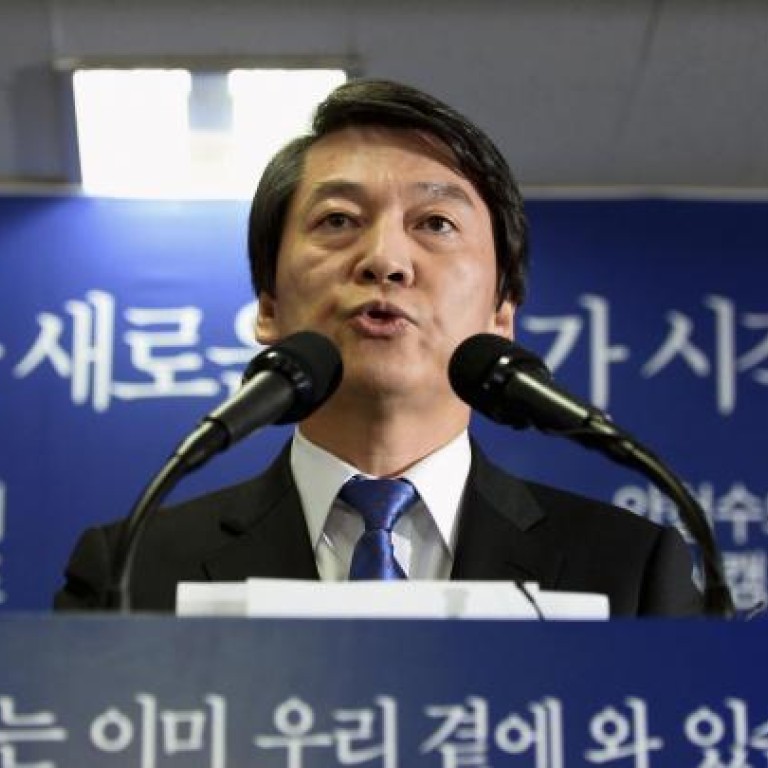
Ahn Cheol-soo quits South Korean race for presidency
Ahn Cheol-soo endorses poll rival to shore up opposition vote against conservative favourite
South Korean software mogul Ahn Cheol-soo gave up his bid to become president yesterday and endorsed another opposition candidate, setting the stage for a close race with conservative favourite Park Geun-hye to lead Asia's fourth largest economy.
Opinion polls had shown that Park, daughter of the country's assassinated leader Park Chung-hee, would have easily won the December 19 election if the opposition had fielded two candidates and split the vote.
But Ahn's decision to step aside leaves Moon Jae-in, a former human rights lawyer and the candidate of the left-of-centre main opposition Democratic United Party (DUP), as Park's main challenger.
"Moon Jae-in is the single candidate ... send Moon Jae-in your support," Ahn, who was running as an independent with a strong backing of urban and young professional voters, told a news conference.
South Korea's economy and relations with North Korea are two of the main issues in the election to replace President Lee Myung-bak, who is serving a five-year term ending in February and cannot run again.
Jae-in has pledged to resume unconditional aid to North Korea and to tighten regulation on big business.
Ahn and Moon had been trying to agree on a single candidate and avoid splitting the anti-Park vote.
But they failed during more than two weeks of bitter discussions to merge their campaigns.
Experts said Ahn's decision to step aside would turn what had looked like an easy win for Park, who is trying to become the country's first woman leader, into a very close race.
"This will have a powerful impact ahead and bring more votes to Moon in the two-way race," said Ka Sang-joon, a political science professor at Dankook University in Seoul.
Moon, 59, has been under intense pressure from his party, which has 127 of the 300 seats in parliament and support from across the country, not to yield to Ahn. Policy proposals from the two main candidates have been remarkably similar considering the differences in their political backgrounds and support bases.
They are both courting a large block of voters who feel their voice has not been heard under the pro-business government of incumbent Lee.
At one point, Ahn suspended the merger talks, with his camp accusing Moon's campaign of lacking commitment to Ahn's main platform of political reform.
"Locking horns over the method of merging candidacies is not righteous for the people any more," Ahn said yesterday, promising to keep fighting for a "new politics".
In an apparent effort to smooth over their differences, Ahn said he would accept the blame for any apparent rift with the DUP camp.
The 50-year-old software mogul, who enjoys considerable support among young liberal voters, had entered the presidential race in September, positioning himself as an outsider untainted by party politics who represented a public desire for political and economic reform.
Ahn's decision will pose a serious threat to Park and boosts the opposition's chances, said Sonn Ho Chul, a professor of political science at Seoul-based Sogang University.
"This is the most dramatic merger one can expect, and it maximises the power of unified forces against Park," Sonn said.
"The merger talks hadn't been smooth and were tiring to watch, but Ahn has made a compromise for the opposition party."
